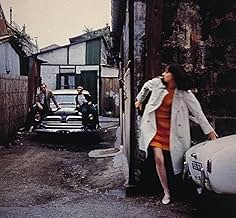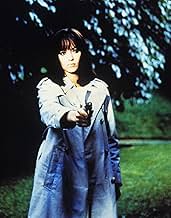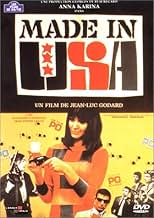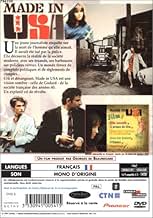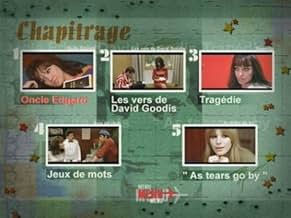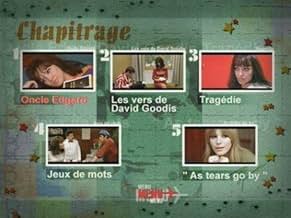In the near future, leftist writer Paula goes from Paris to the French town of Atlantic-Cité when she learns of the death of a former colleague and lover, Richard P. Is she there to investig... Read allIn the near future, leftist writer Paula goes from Paris to the French town of Atlantic-Cité when she learns of the death of a former colleague and lover, Richard P. Is she there to investigate? On the surface, faces are beautiful, colors bright, clothes trendy. Beneath, little i... Read allIn the near future, leftist writer Paula goes from Paris to the French town of Atlantic-Cité when she learns of the death of a former colleague and lover, Richard P. Is she there to investigate? On the surface, faces are beautiful, colors bright, clothes trendy. Beneath, little is clear: some talk to Paula as if she's Alice in Wonderland, corpses pile up, and ideologi... Read all
- Paula Nelson
- (as AK)
- Richard Widmark
- (as LS)
- Donald Siegel
- (as JPL)
- David Goodis
- (as YA)
- Man with Marianne Faithfull
- (uncredited)
- Policeman
- (uncredited)
- Richard Nixon
- (uncredited)
- Inspector Aldrich
- (uncredited)
- Bill Poster
- (uncredited)
- Barman
- (uncredited)
- Workman in bar
- (uncredited)
- Dental Assistant
- (uncredited)
- Richard Politzer
- (voice)
- (uncredited)
- Robert MacNamara
- (uncredited)
- Girl in Bandages
- (uncredited)
- Doris Mizoguchi
- (uncredited)
- Self
- (uncredited)
- Director
- Writers
- All cast & crew
- Production, box office & more at IMDbPro
Storyline
Did you know
- TriviaThough based on "The Jugger" by Richard Stark (Donald E. Westlake), the author received no compensation for this adaptation. Westlake, who passed away at the end of 2008, successfully kept the film from being shown in the US during his lifetime.
- Quotes
Marianne Faithfull: It is the evening of the day / I sit and watch the children play / Smiling faces I can see / But not for me / I sit and watch / As tears go by / My riches can't buy everything / I want to hear the children sing / All I hear is the sound / Of rain falling on the ground / I sit and watch / As tears go by / It is the evening of the day / I sit and watch the children play / Doing things I used to do / They think are new / I sit and watch / As tears go by
- ConnectionsEdited into Bande-annonce de 'Made in U.S.A.' (1966)
- SoundtracksAs Tears Go By
Written by Mick Jagger, Keith Richards and Andrew Loog Oldham
Performed by Marianne Faithfull
Neon signs and electronic news ribbons proliferate. So do comic strips and film stills. Most of the characters, like Donald Siegel and Doris Mizoguchi, are named for Godard's favorite movie figures, and allusions to American movie characters are everywhere, including three from three separate films by Otto Preminger, who also has a street named for him in the movie's make-believe Atlantic City. This stunningly self-conscious political diatribe's cinephilic gags and cartoon violence smack of Alphaville.
In her final performance for Godard, Anna Karina is Paula Nelson, a P.I. swathed in an overcoat and packing heat. As The Big Sleep has an infamously indecipherable plot, one of whose many murders not even Hawks could clarify, so this is Godard's most unrelentingly unbalanced of plot convention. Crucial scenes, if you can call them that, are systematically minced right at the moment of revelation. Information in the dialogue is resolutely buried by street noise or two brash Beethoven chords, as, variantly seductive and apathetic, Paula goes looking for an ostensibly vanished lover, likely dead, in a tangled, tortuous, never elucidated international political conspiracy.
Supposedly, Godard had much more than Raymond Chandler and Donald E. Westlake on one's mind. This patchwork mingles the Americanization of French life with the widespread controversy of mid-60s France, the vanishing of Morocco's foremost leftist, a political expatriate in France and a third-world personage then akin to Malcolm X or Che Guevara, kidnapped by French police acting in cahoots with the Moroccan government, which evidently had him tortured to death on French terrain. That he disappeared while traveling to a development meeting for a documentary, made the incident even more dramatic for Godard. Supposedly, this work of sociopolitical meta fiction is an imagining that he'd not died but had hidden in the provinces, wrote to his girlfriend to meet him. When she gets there, she discovers him dead.
So the movie starts with Paula secluded in a shoddy hotel room in the characterless Paris suburb that doubles for Atlantic City, reflecting on her state of affairs while a couple of hooligans, played by New Wave regulars László Szabó and Jean-Pierre Léaud, linger portentously under her window. "Hanging out" is one of the movie's "active" (if that word could be used) factors. This awkward satire has characteristics of the sometimes fascinating, sometimes pedantic time-languishing revue that distinguished the art-house of the '60s. Early on, Marianne Faithful sits inexplicably in a neighborhood café, nonchalantly trilling As Tears Go By a cappella. But chiefly, Raoul Coutard's camera stares at the star, a statue. Frankly, you could forget all about the political and sociological vinegar and find the movie's really all about contemplating Karina's concealed grins, her dark hair, her switching clothes, and her eerie ability to turn any given shot into a fashion promo. Considering that we hear her voice-over all over, it's not unlike a Jarmusch-esque lone wolf enterprise.
Plot, to use the term carelessly, accelerates when Paula slays the irritating midget stoolie Mr. Typhus: "Now fiction overtakes reality," she self-narrates. Storytelling is leaps and bounds more complicated and theoretically brutal here as in The Big Sleep or Kiss Me Deadly. Like Marlowe or Hammer, Paula finds a succession of corpses during her mission. She also leaves a footpath of others as her own upshot, including one whom she just shoots at close range. Later on, she serves the movie's most celebrated, and loaded, line: "We were in a political movie. Walt Disney with blood." Roughly when characters named Nixon and McNamara show up as hoodlums, played by young film critics, the reel-to-reel tape recorders that have been sporadically stationary in close-up to play messages left by Paula's lover change to egalitarian discourse.
The movie is anti-capitalist and anti-consumerist, condemning miniskirts and rock and roll as manner of fascist brainwashing, but more invested in the kitschy modernism favored by the informal consensus within the mainstream of Western culture than any movie Godard made prior or since. Paula asserts that advertising is a form of fascism, representing the director. It's a legitimate grievance and an upsetting one, considering that Made in U.S.A. is a relentless commercial for itself. Perhaps the cleverest thing about it might be its title, which offers perspective on that element.
Pending this work, Godard was a nationalist for some, a populist for others, but didn't folks assert the same thing about Orson Welles? And yet for others, he was just an armchair politico. Made in U.S.A. is an opinionated exploit that's equally as sincere as a formal expression of political will, a judgmental breakdown of pop culture and a cautionary lecture in which, this time, the filmmaker has become so explicitly caught up that he felt he had to film it himself.
- How long is Made in U.S.A?Powered by Alexa
Details
Box office
- Budget
- $50,000 (estimated)
- Gross US & Canada
- $95,209
- Opening weekend US & Canada
- $11,147
- Jan 11, 2009
- Gross worldwide
- $95,304
- Runtime1 hour 30 minutes
- Sound mix
- Aspect ratio
- 2.35 : 1
Contribute to this page



